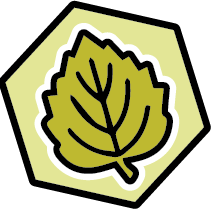
What is compost?
Compost is the result of combining biodegradable materials such as yard debris and/or food waste to create soil. Composting requires the teamwork of microorganisms, water, soil, and oxygen. It is also an inexpensive way to dispose of food and yard wastes, while also making fertilizer for gardening, agriculture, and house plants.
- Biodegradable material
- Material that can be broken down by its environment & microorganisms.
- Microorganisms
- An organism that is small enough to be considered microscopic.
Why is composting important?
Composting is a natural cycle. Instead of throwing away food items and yard wastes that eventually end up in the landfill with material that is not decomposable, collecting compost material allows the material to decompose. In a landfill, food and yard wastes will not decompose because of the lack of oxygen and light. This is a problem because the wastes release greenhouse gases such as methane. Too much methane in the atmosphere can accelerate climate change because of the greenhouse effect. Composting can also save you money. With less wastes in the garbage, you do not have to pay as much to dispose of it.